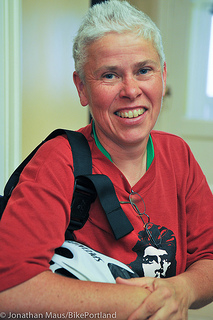If more people of modest means had access to an affordable, dependable cargo bike, could they avoid being sucked into “forced car ownership”? Can cargo bikes play a role in rebuilding a city devastated by a major earthquake? Jane Pearce, a PhD student in the Geography department of Canterbury University in Christchurch, New Zealand visited Portland for two weeks this past June to better understand those questions and to further explore the social justice implications of cargo bikes.
On February 22, 2011, a massive earthquake ripped through Pearce’s hometown of Christchurch. 180 people died and much of the city remains, a macabre reminder of what was lost that day. Pearce came to Portland because of the extensive community that has developed around cargo bikes here; but, as a survivor of the Christchurch quake, she found special significance in the Disaster Relief Trials event.
“I commend the people that organized and took part in the relief trials event,” she shared with me, “You are never going to simulate what it’s actually like but that’s not the point — you are becoming aware of what it might take to help. Whilst Christchurch went into total grid-look with no electricity, water, sewerage, destroyed roads, buildings, fires, liquefaction you name it; people normally reliant on cars, public transit, and so on, took hours to get home. I managed to cycle home through the mayhem and it took hardly any longer than normal — proof that bikes really are versatile in extreme situations.”
“I believe that cargo bikes could be a way of people on low incomes actually ‘getting one over’ on motorists because of the massive cost savings of not being ‘forced’ into owning a car.”
— Jane Pearce
Pearce began her cargo bike research before the quake, but the Disaster Relief Trials event has spurred her interest at how such bikes can play a role in disasters — and how they might help Christchurch rebuild both its transportation and social networks. While in Portland she met with low-priced cargo bike maker Tom LaBonty, local cargo bike business owners, Portland State University bike researchers, and others.
I sat down with Jane before she left. Below is a portion of our chat:
“Well that’s my research question so I guess the short answer would be that you’ll have to wait until I’ve finished this particular piece of research! The more nuanced answer is not so simple. I certainly think they could but there a lot of hurdles to overcome. In my opinion here in NZ we need more people using cargo bikes to generate visibility and we need builders to make them more affordable. We also need bike libraries so that people can be introduced to, and get to try out a range of bikes before they think about purchase. I like the bike library model that Cycles for Change [in Minneapolis] are using where low income women can access a kids bike trailer for 6 months at a time — I would like to see that idea put into action with a range of cargo bikes.
I believe that cargo bikes could be a way of people on low incomes actually ‘getting one over’ on motorists because of the massive cost savings of not being ‘forced’ into owning a car. This is not only true for personal transportation; it is also possible to greatly reduce business start-up costs by operating a cargo-bike based business where the cargo bike is your shop-front, transportation and advertising.”
“It does both. Bike infrastructure was damaged in the quake as was every other form of infrastructure and we will be living in a demolition and building site for the next 10-20 years. This is of course an opportunity and a threat. With the political will we could end up with a world leading cycle-friendly ‘sustainable’ city. Unfortunately we currently have a right-wing government in NZ who can’t see beyond the end of their nose in terms of automobility, and are obsessed with building ‘roads of national significance’; they certainly do not see roads as public spaces.
Despite the damaged roads and the central city still being closed off, my experience is that cycling is still a very effective way of getting around as pedestrians and cyclists can access spaces that are still not accessible to other vehicles. One very exciting development that occurred whilst I was in Portland was that the first business-owned cargo trike has been brought into Christchurch to operate in a cyclelogistics business.”
“How willing the cargo bike builders, retailers and users were to give of their time to talk to me, and how they welcomed me into their space. I have a very positive glow from my Portland visit! For me it was the first time I was able to see a range of cargo bikes in one city. I loved being able to move around the city on my my bike and randomly come across cargo bikes parked-up or in use. It was also the first time I’d been able to observe cyclelogistics companies in action using cargo bikes and this has really pushed business cyclelogistics up my research agenda.”
—
We’ve seen cargo bikes revolutionize family biking and small business in America. More recently, we’ve seen how they will play a vital role in disaster response. Pearce’s important research about the social justice potential of cargo bikes, adds yet another exciting reason to love cargo bikes. I’ll share more of Pearce’s research once her thesis is completed and I have a feeling we’ll be hearing much more from her in the future. Good luck Jane! It was great to meet you.


